As much fun as watching and discussing new dramas can be, I love looking back to the things I watched in my first few years as a drama fan. I love revisiting, re-evaluating, and noticing things that went over my head before, or things that are surprisingly interesting in hindsight.
Here is one such drama, Ma Boy! I can’t believe this came out over 10 years ago, but baby Kim So-hyun confirms it. Only three episodes long and the first drama to air on kids channel Tooniverse, Ma Boy is a silly little romcom that makes for a nice quick watch. It’s a cute story with remarkably likeable supporting characters (if you just ignore the sasaeng of it all), a short and sweet little package.
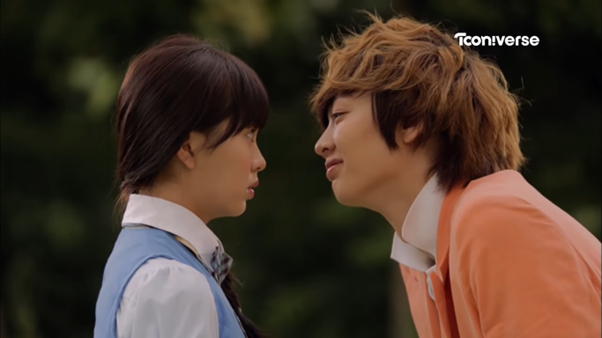
I giggle thinking about various ahjussi executives gathered in a room to plan this show: What do the kids do these days? Listen to k-pop! Obsess over celebrities! Dream about beautiful flower boys! And thus, the story of Jang Geu-rim, the latest student at a school home to the most famous young singer (her crush) and popular young model (“Irene”, aka Hyun-woo, secret crossdresser extraordinaire and aspiring idol, who, whoops, is also Geu-rim’s roommate) was born.
I rewatched it recently for nostalgia reasons and… was surprised. Because Ma Boy unintentionally does some very subversive things, and sets up a dialogue about idol culture that, while harmless on the surface, is pretty sinister in the hands of an overanalyser such as myself.
Let’s go!
Somewhere Over the Rainbow: A Heroine with Leukemia
Jang Geu-rim, the sunshine-incarnate heroine of Ma Boy portrayed delightfully by Kim So-hyun, is an anomaly. When she’s introduced, this is what we learn about her:
- She’s a new student at this art school.
- She likes to sing.
- She has a crush on singer Tae-joon.

So nothing of consequence, basically. At this point, Geu-rim is an audience surrogate for the little girls and tweens who may like to fantasize about going to an art school and mingling with their idols. She’s your classic cheery, peppy, eager, normal girl.

And then it’s revealed that she had leukemia.
The way sickness is handled in this drama is kind of incredible. We discover that she’s not just a regular basooni – her idolisation of Tae-joon comes from a more sincere place, since he visited her hospital when she was sick and indirectly was a massive consolation to her. It establishes a connection between them that is sweet without being forced and unbelievable.

But really, isn’t it kind of wild that the drama just dropped this fact in and left it there? Geu-rim’s illness makes up only a small pat of her, she isn’t defined by her past sickness at all. We don’t even find out about it until a third of the way through! Maybe I’m overreacting, but I can’t think of a single piece of Korean media that establishes a character as recovering or recovered from an illness without bringing it back at the last minute. But here, there’s no final hour crisis where her cancer comes back! The show treats her like a healthy girl, because she is. The show handles her illness with lightness, because it’s just another facet of her ordinary life. I love that.
Fan Culture and the War Between “Taecl” and “Icl”
Ma Boy is very cavalier about parasocial relationships. It makes light comedy of obsessive amateur fan clubs invading the boundaries of, and creepily obsessing over, their idol classmates. This is embodied in “Taecl” and “Icl” (neither translate well, but they’re portmanteaus of “Tae-joon Club” and “lrene Club”). The clubs are gender-swapped mirrors of each other, and act as both rivals and reluctant partners to each other before teaming up at the end to effectively save the day and protect both their idols from scandal. I ended up liking these kids for how the actors glibly portrayed them, but that doesn’t mean that some of their behaviour wasn’t genuinely concerning.
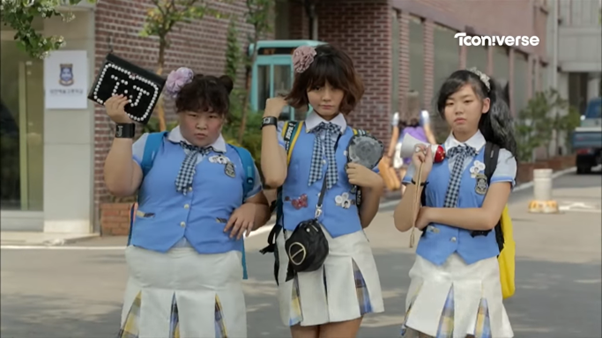
For instance, the three boys of Icl plotting to humiliate Geu-rim by locking her in dark room and getting photos of her all scared… is hard to hear in good faith. But this is a show for babies, and they’re not the “bad guys”, so we’re expected to see it at face value. Leaving the rapeyness of that particular example aside, though, the abundance of scenes like this make me think that I ought to write something about the low-key romanticisation of sasaengs in dramas. I can list off three more examples off the top of my head (Star of the Universe being the absolute worst offender) where awful behaviour is excused because the story has positioned them as good, or at the very least, as harmless.
Taecl and Icl are bullies… but they had decent intentions, so they’re harmless. See, guys, fan culture isn’t so bad!
The Reverse Genderbender
I find it hilarious that there are literally two dramas that focus in any meaningful way on a man crossdressing as a woman (instead of the opposite), and they both star Kim So-hyun. Before there was Tale of Nokdu, there was Ma Boy. Ma Boy‘s genderbending hero Hyun-woo is forced into modelling as a woman for two reasons. One, his agency aren’t making any money, and with him unable to debut as an idol they were inclined to look into other solutions. And two, his management thought it would take advantage of his androgynous-bordering-feminine visuals.
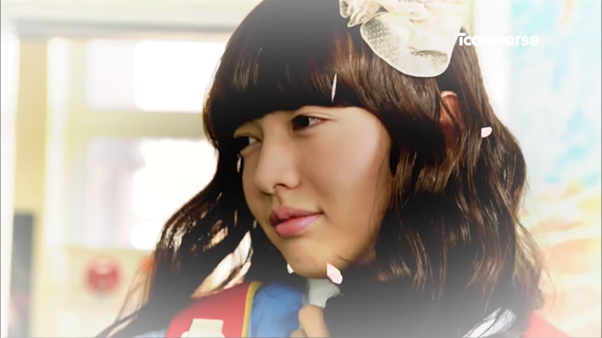
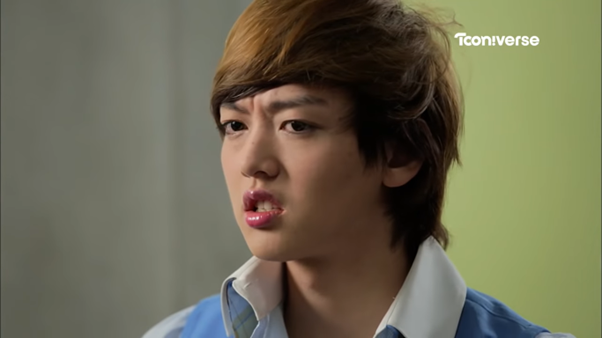
Obviously the first part is just a plot contrivance, but I find the second part extremely interesting. Hyun-woo’s management attribute his inability to debut as “not being masculine enough” to be an idol. Which is hilarious, no? Because I’m not sure what things were like a decade ago, but as it stands, K-pop and Korean idol culture have gone a long way to attacking that binary between masculine and feminine. But even ten years ago, we were at the forefront of the “flower boy” revolution, carving out a world where k-drama heroes can wear purple lipstick without judgement! Because of this, Hyun-woo being told that he can’t debut because he doesn’t cut it visually feels like bullshit.
So… why isn’t he succeeding then?
“You Look Like You’re Fighting With Dance” and the Glamorisation of K-pop
It’s not surprising that pursuing a career in the arts is romanticised in fiction. It provides a clear juxtaposition to our dry reality to imagine a world where we’re celebrated and idolised for our talents. While this show is definitely guilty of that, I appreciated the brief reality check of Hyun-woo’s struggle to be acknowledged. The reality of the K-pop industry, after all, is that some people just never make it, often for trivial reasons out of their control, but are expected to carry on hustling until their efforts pay off.
Hyun-woo’s effort to become an idol isn’t paying off because the people who have the power to change his life can see his desperation. The stress of trying to meet these invisible standards exudes from his pores, affects the way he dances. When Hyun-woo confides in Geu-rim about his double life, she has a solution. “It looks like you’re fighting with dance,” she says, “Loosen up, enjoy it.” So he does, and of course, he then gets noticed.
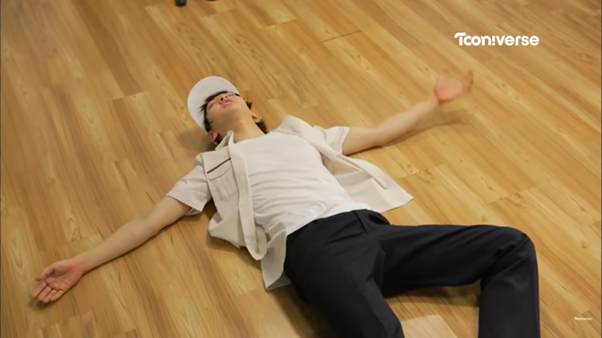
But isn’t that kind of gross? In the end, Ma Boy brushes over its own observation that the K-pop industry is systemically broken and crippling its talent before they’ve even debuted, and asserts that if these young people just let go and enjoy the grind, all their struggles will be over. Isn’t that fucked up?
